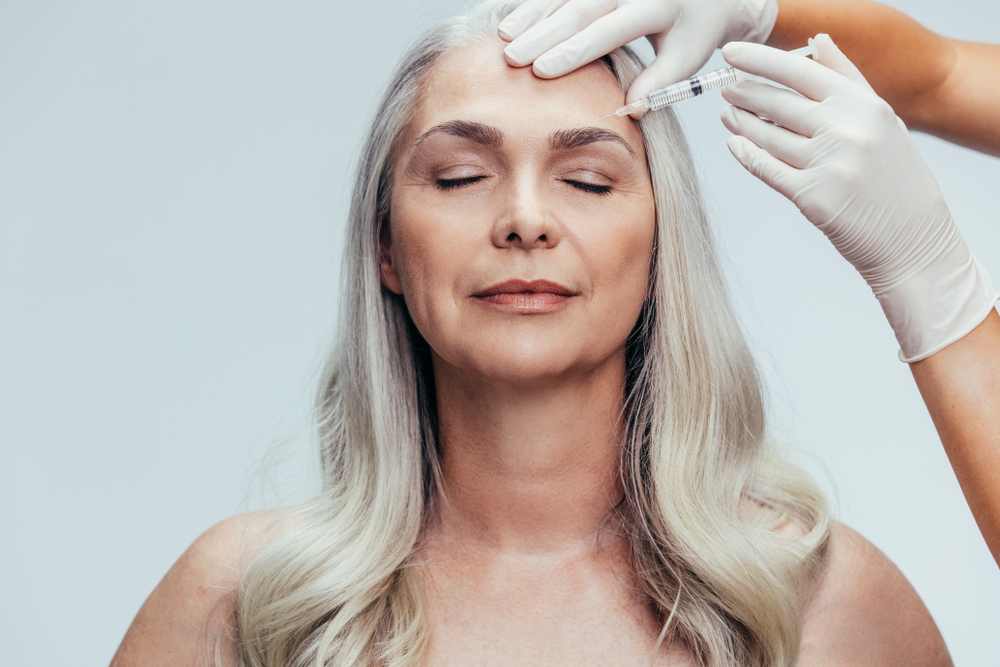Three years ago, Susan Guest, 60, from Huddersfield, began to feel a tightness during sex that caused pain but had no idea why.
It wasn’t until her husband noticed what he thought was toilet roll stuck on her vulva that has since resulted in a diagnosis of Lichen Sclerosis for Sue, a progressive disease that affects more women than men.
Mrs Guest said: “My husband thought I had a bit of white toilet tissue stuck down below. I took a closer look and noticed that my labia had dry white patches, and that’s when I also saw an ulcer.
“The disturbing thing was that I never felt any symptoms from the ulcer, it wasn’t sore despite being open and raw. Naturally, I panicked and got an emergency GP appointment where they told me that I had to be referred to the hospital to rule out vulva cancer.”
Mrs Guest was seen by a gynaecologist who took a biopsy and later confirmed the diagnosis of Lichen Sclerosis.
The 60-year-old said: “The sad thing was that even those working within that department seemed to have little knowledge of the disease and I felt the awareness around it was poor.
“I was advised after my urgent appointment I would be seen every six months, but it took 13 months to even get a second appointment never mind every 6 months.
“Lichen Sclerosis isn’t usually ulcerative so due to the ulcer on my vulva, I was also referred to an oncologist for a second opinion to rule out cancer.”
Mrs Guest’s further tests ruled out cancer, which she says was a relief, and she was given a steroid cream to ease and manage the symptoms.
Mrs Guest said: “I haven’t been able to be intimate with my partner for three years now as it is just too painful to have sex. My Lichen Sclerosis is progressive making my vaginal opening narrow and spreading to my anogenital area.
“I feel like I have lost everything because of this. I don’t feel feminine or sexy anymore. I am constantly sore and although I am lucky as my husband and I have been together for 40 years, it doesn’t make the fact that we can’t be intimate together any easier.
“I still feel like a young woman in my head, and it is a scary thought to think I may not be able to be intimate with my husband ever again.”
The NHS has offered Mrs Guest very little support, and she says she has been left to her own devices to manage the disease.
Mrs Guest said: “It was by chance I met Dr. Farzana Khan on my way to a conference on the train. We got talking and when she told me what she specialised in, I burst into tears at the realisation that maybe this was the support and help I needed and had been looking for…It felt too good to be true.”
Dr. Farzana Khan is a regenerative functional aesthetic doctor with a special interest in women’s intimate health and menopause. She offers a range of regenerative and rejuvenating treatments for women suffering from vaginal dryness, lichen sclerosis, and genitourinary symptoms of menopause.
Mrs Guest said: “Dr. Farzana handed me some leaflets that I could read including one on the Asceplion Juliet laser. My friends thought the leaflet she had given me on the train about the treatment was a sex toy magazine! I took Dr Farzana’s number and contacted her later and arranged an appointment straight away with her in her Leeds Clinic.”
Dr. Farzana said: “Susan has had two courses of platelet-rich plasma (PRP) therapy with two courses of Asceplion Erbium YAG laser.
“PRP is a non-surgical treatment designed to rejuvenate the vulva and vagina using your own plasma rich in growth factors which will boost and repair your vaginal tissue. When PRP is injected into the vaginal area, it promotes the healing of the vaginal tissues and improves the quality of the vaginal walls.
“PRP also enhances vaginal lubrication and sensitivity in the clitoral complex and can help treat symptoms such as dyspareunia (painful sex), vaginal dryness, and lichen sclerosis. Women who have had the PRP vaginal rejuvenation treatment have been shown to have enhanced sexual benefits including improvement in sex drive, arousal, vaginal dryness, vaginal itching, and lichen sclerosis symptoms.
“Patients usually need a course of two to three PRP treatments 4-6 weeks apart and then one treatment as annual maintenance to slow down the progression of the disease. The PRP treatment can be combined with laser therapy such as Erbium YAG laser which works well for moderate to advanced disease.”
Dr. Farzana added: “Susan has had 2 courses of PRP with 2 courses of Asceplion Juliet Laser. The aim is to improve her symptoms, improve lubrication, reduce itching, and allow her to be intimate without being in pain.”
Mrs Guest said: “I was nervous at the thought of the treatment as I hate needles, but it was fine with no downtime after.
“I have had 3 treatments with Dr Farzana at her clinic and it has been life changing. My skin down below is much better and has returned to pink, rather than white and I have felt much more comfortable in general.
“I met a lady at Dr Farzana’s clinic who also suffers from lichen, and she has since been intimate with her partner which fills me with hope. I feel there needs to be more awareness of other treatments such as the one offered by Dr Farzana
“For me, just some form of intimacy is the goal and although the disease can’t be stopped, I would like to be able to just slow it down and feel better in myself in general.”
Do you have a story to tell? Email Holly@harleystreetcommunications.co.uk
Information on Lichen Sclerosis
LS causes itchy and painful patches of thin, white, wrinkled-looking skin. Women with LS often experience pain and the introitus (the external opening of the vaginal canal) may become narrow, which results in painful sexual intercourse or prevents sexual penetration altogether. Because of the architectural changes in the vulva, some women are ashamed, embarrassed, and potentially uncomfortable and insecure being intimate with a sexual partner resulting in less frequent and less satisfying sexual activity.
Vulvar Lichen Sclerosis Symptoms:
- Intense itching
- Irritation from vigorous scratching
- Small painful fissures (perineum, the clitoral hood, between the labia)
- Vulvar pain
- Painful sex
- Whitish hue on the vulvar skin upon exam
- Possible fused clitoris or stuck together
- Flattened labia and very thin tissue
- Red or bruised vulvar tissue due to scratching
The direct cause of LS is not well understood and may occur due to a variety of factors such as genetics, hormonal, external irritants, immune-mediated, and infectious. LS is known to mainly affect menopausal women, and diagnosis is assumed based on visual inspection and confirmed by a biopsy.
There is no cure for LS and the goals of treatment are to alleviate symptoms of itching and pain and prevent anatomical changes due to scarring. The gold standard treatment for LS is potent topical steroids and most women tolerate this therapy without any long-term side effects. Alternative treatments to steroids are platelet rich plasma therapy, polynucleotides and energy-based devices which are offered by Doctor Farzana.













